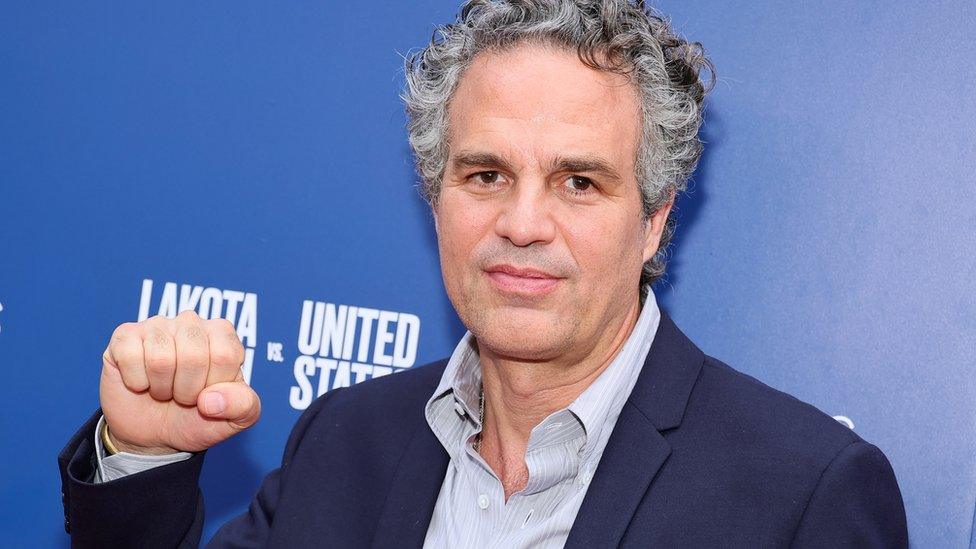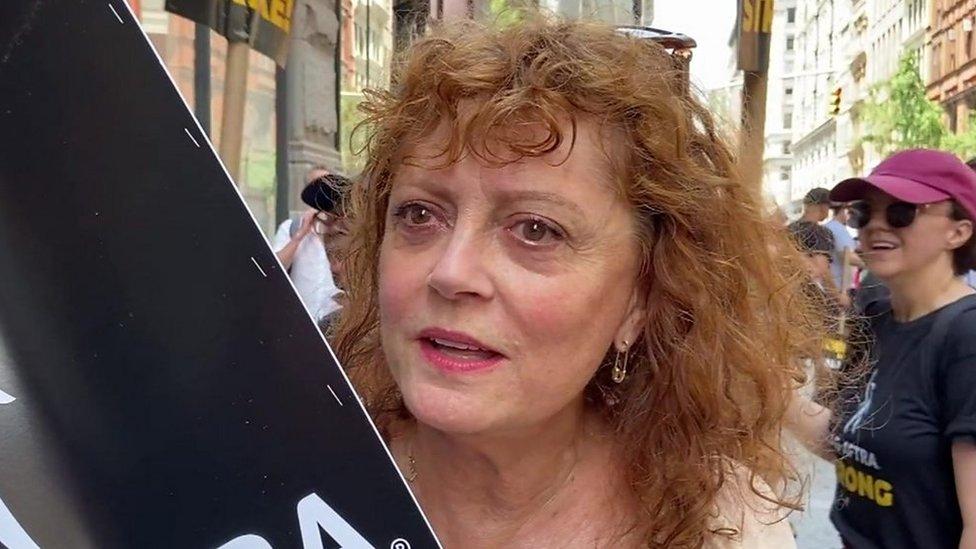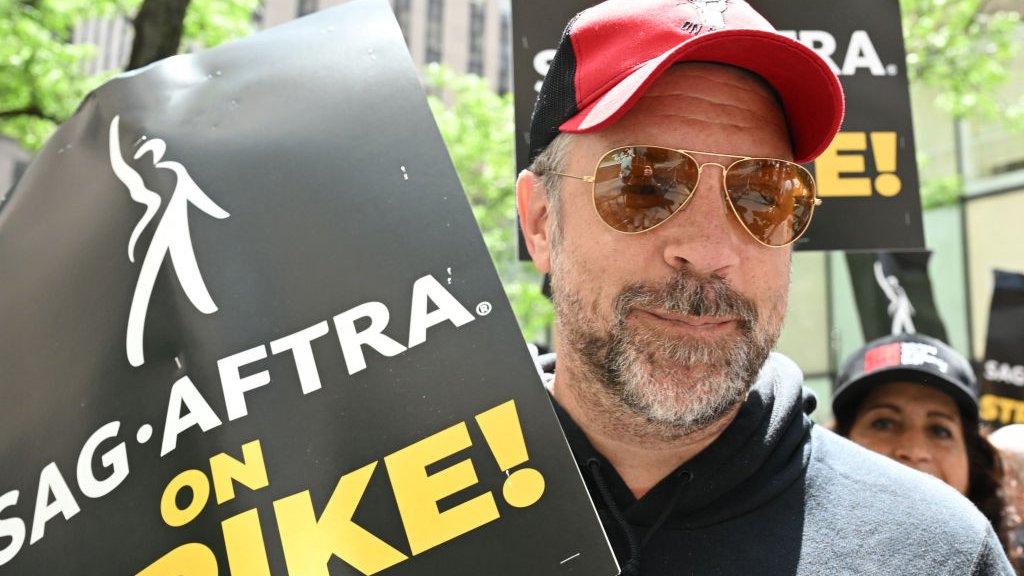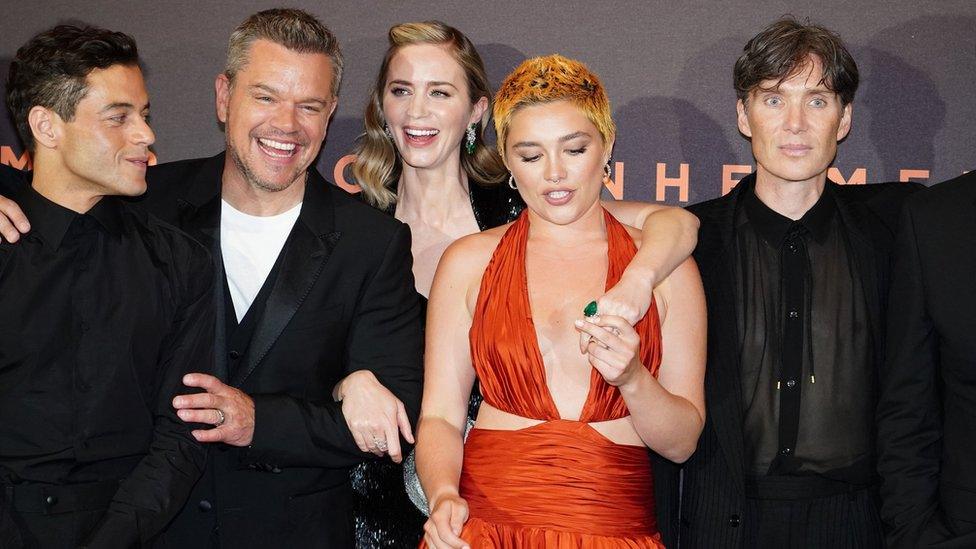Actors' strike: Mark Ruffalo says cut out Hollywood 'fat cats'
- Published

US actor Mark Ruffalo stars alongside Jennifer Garner in the 2004 fantasy rom-com 13 going on 30
Mark Ruffalo is encouraging fellow actors and writers to work together to cut out Hollywood's "fat cats" by making independent films and shows.
His comments follow the start of the actors' strike that last week brought the entire industry to a halt.
George Clooney, Susan Sarandon, Jason Sudeikis and thousands of other actors joined screenwriters for Hollywood's biggest walkout in over six decades.
"How about we all jump into indies now?" tweeted Ruffalo, external over the weekend.
Tens of thousands of Hollywood actors have joined writers in taking industrial action, because they want streaming giants to agree to a fairer split of profits and better working conditions.
The Screen Actors Guild also wants to protect actors from being usurped by digital replicas.
On Sunday, the world premiere of Disney's star-studded film Haunted Mansion became the first major Hollywood event to go ahead without its actors, which include Danny DeVito and Jamie Lee Curtis.
Avengers and Spotlight star Ruffalo went on to say that while actors and screenwriters have "made great content", the business brains behind them had "created an empire of billionaires", who are "laughing like fat cats" and "believe we are no longer of value".
In a statement shared with the PA news agency, Clooney said: "This is an inflection point in our industry. Actors and writers in large numbers have lost their ability to make a living.
"For our industry to survive that has to change. For actors that journey starts now."
Orange is the New Black star Kimiko Glenn posted on Instagram, external that she earned just $27.30 in in a royalties statement for residual payments, for streaming of the hugely popular show.
Watch: How the Hollywood strike affects you in 75 seconds
Other big names like Halle Berry, Alec Baldwin, Nicolas Cage and Olivia Wilde have also expressed their support for the strike which will see actors picket US studios again on Monday.
Disney CEO Bob Iger, however, has called the action "very disruptive" and having arrived at the "worst time", while also describing the expectations of the writers and actors as "just not realistic".
Watch: Brian Cox: 'I am concerned about artificial intelligence'
The striking actors are joining writers who walked out in May, concerned about pay, working conditions and the industry's use of artificial intelligence (AI).
Brian Cox, the lead actor on HBO's Succession, told the BBC the strike could last "until the end of the year".
What happened last week?
Talks for a new contract with studios and streaming giants broke down last Thursday, with the Screen Actors Guild (SAG) accusing the Alliance of Motion Picture and Television Producers (AMPTP) of being "unwilling to offer a fair deal".
The AMPTP said in a statement that it was "disappointed" by the collapse of negotiations, noting: "This is the union's choice, not ours."
Soon after, the stars of Oppenheimer walked the red carpet before skipping their own film premiere, in order to "go and write their picket signs", director Christopher Nolan noted.
Watch: Oppenheimer actors talk Hollywood strike
By noon on Friday, union members and their supporters had gathered outside the offices of major studios and streaming services, including Warner Bros, Netflix and Disney, in Los Angeles, New York and other cities.
"If you don't have the foresight to put something in place for the future, then you're screwed," Oscar-winner Sarandon told the BBC from a picket line in New York.
"It's clear that nothing is going to change from the top down, it's going to be up to us at the bottom."
Watch: Susan Sarandon on the dangers of AI in film industry
Productions likely to be affected by the strike include sequels to the Avatar, Deadpool and Gladiator franchises, as well as upcoming seasons of shows such as Stranger Things, Family Guy and The Simpsons.
Red-carpet premieres, promotional interviews and events including the Emmys and Comic-Con, have already been halted, rescheduled or scaled back, as actors will not appear in films or even promote movies during the stoppage.
Watch: The famous faces out and about on the picket line supporting the Hollywood strike
The actors' strike began a week before the UK cinema release of two of the biggest films of the year, Oppenheimer and Barbie, and shortly after the first instalment of Mission Impossible 8 landed, meaning cinemas are still likely to be busy over the the coming months.
Phil Clapp, chief executive of industry body Cinema UK told the BBC they were "concerned by anything which might potentially threaten the supply of films to the big screen" adding they were "hoping for a quick resolution to the current dispute."
He added: "That said, there is already a strong slate of films locked in for the weeks and months to come... with other major titles stretching into 2024 - promising to entertain millions of cinema-goers.
"Unless the current strike is a protracted one, we are confident that cinemas we will see little if any disruption in the foreseeable future."
Related topics
- Published15 July 2023

- Published14 July 2023

- Published13 July 2023

- Published14 July 2023

- Published13 July 2023
